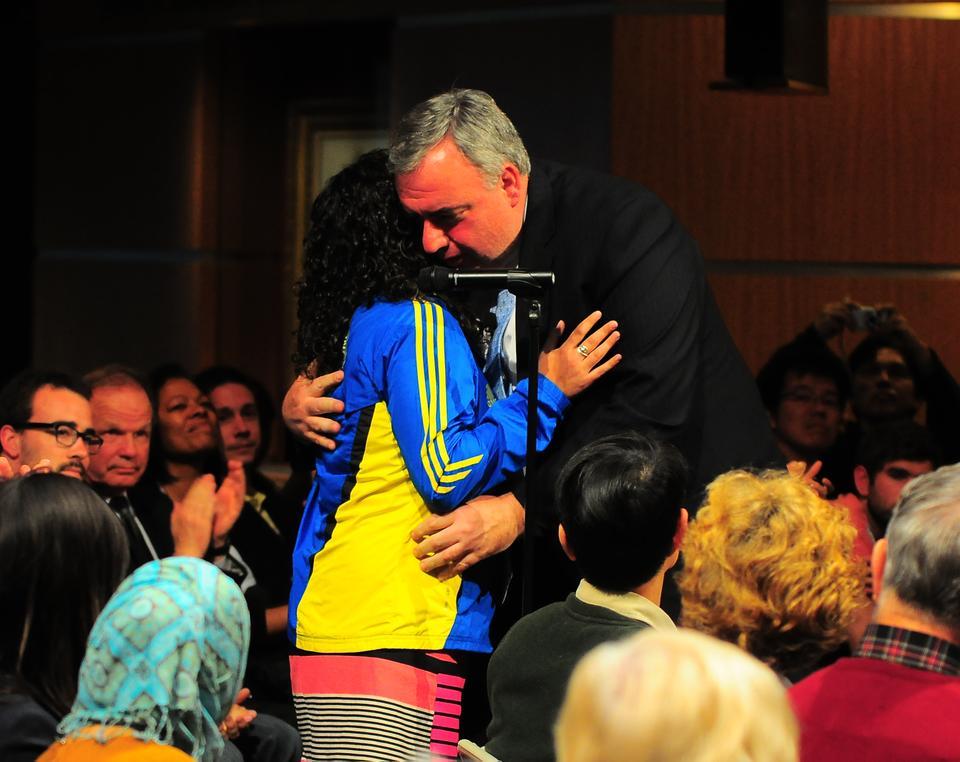
News
HMS Is Facing a Deficit. Under Trump, Some Fear It May Get Worse.

News
Cambridge Police Respond to Three Armed Robberies Over Holiday Weekend

News
What’s Next for Harvard’s Legacy of Slavery Initiative?

News
MassDOT Adds Unpopular Train Layover to Allston I-90 Project in Sudden Reversal

News
Denied Winter Campus Housing, International Students Scramble to Find Alternative Options
BPD Commissioner Reflects on Manhunt at IOP

Boston Police Commissioner Edward F. Davis said that high levels of training and familiarity between different agencies were crucial to law enforcement’s quick apprehension of the Boston Marathon bombings suspects at a Wednesday panel at Harvard’s Institute of Politics.
“We all knew each other,” he said, speaking of the members of various law enforcement agencies, many of whom had trained together in disaster-type scenarios before the marathon.
“We were people who had worked together and trained together and seen each other on a regular basis.”
He added that various types of disaster-scenario training had “forced us to think about this, to think about the unthinkable.”
Massachusetts Emergency Management Agency Director Kurt Schwartz said he agreed with Davis, adding that the city was prepared for a bombing at the marathon.
“All of the agencies and resources were [already] staged,” he said.
“We spent months preparing for the marathon. We did a tabletop exercise the week before which included a bomb scenario in it.”
As moderator, Kennedy School Dean David T. Ellwood ’75 led the panel beyond the mechanics of the initial response to a discussion of the role of social media in the investigation.
Almost immediately after the bombs went off, various websites—including Twitter and Reddit—served as forums for a discussion that was at times illuminating and at others irresponsibly speculative.
At least one newspaper, the New York Post, published some of that speculation, suggesting in a front-page headline that two men were close to being considered suspects in the case when, in fact, they were not.
“That’s not logical, that’s not something that we expected,” said Davis of the mainstream media’s willingness to jump to weighty conclusions based on unconfirmed speculations. “I think it’s irresponsible on the part of the people who did it. It’s clearly a downside [to social media.]”
Though Ellwood, Davis, and Schwartz steered the discussion, other members of the panel offered a variety of perspectives removed from the lens of law enforcement officials.
WBZ-TV anchor David Wade recalled reporting from Watertown, where the Tsarnaev brothers were engaging with throngs of police. Wade said that he had fairly simple goals when he arrived at the scene.
“[I told myself] don’t get in the way, don’t give away their tactical information,” he said of the dynamic between media and law enforcement.
Explaining how he gathered reporting, Wade said he found most of his information by talking to officers who were making their way to the scene, and was able to describe what transpired for viewers using that information.
Wade said that although he always aims to gather information for his audience, in Watertown it was paramount to let law enforcement officials operate freely.
“What they’re trying to do in a situation like that is far more important than what I’m trying to do,” Wade said.
“I never got any shame in saying what I didn’t know,” he added.
Another panelist, Juliette N. Kayyem, a Kennedy School lecturer in public policy who contributed to multiple media outlets last week, also addressed the coverage of the bombings and investigation, giving particular praise to the Boston Globe, calling the paper’s work covering the marathon “proof of why you need strong local newspapers.”
The event was attended by about 120 people and featured a lengthy question-and-answer period at the end.
One participant in that session, Kennedy School Admissions Coordinator Jamie Bergstein, took the microphone wearing her blue and yellow Boston Athletic Association marathon jacket.
“This is for Commissioner Davis,” she said, beginning to choke up. “It’s not a question. I just wanted to thank you.”
—Staff writer Matthew Q. Clarida can be reached at clarida@college.harvard.edu. Follow him on Twitter @MattClarida.
Want to keep up with breaking news? Subscribe to our email newsletter.
